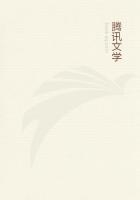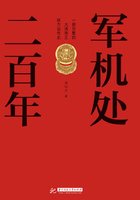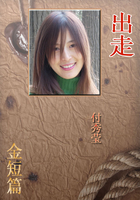And before the others could appreciate his intention he snatched up the dagger, sprang at the other door at the lower end of the passage, burst it open, bolt and all, and confronted Bruno in his dressing-room. As he did so, old Parkinson tottered in his wavering way out of the door and caught sight of the corpse lying in the passage. He moved shakily towards it; looked at it weakly with a working face; then moved shakily back into the dressing-room again, and sat down suddenly on one of the richly cushioned chairs.
Father Brown instantly ran across to him, taking no notice of Cutler and the colossal actor, though the room already rang with their blows and they began to struggle for the dagger. Seymour, who retained some practical sense, was whistling for the police at the end of the passage.
When the police arrived it was to tear the two men from an almost ape-like grapple; and, after a few formal inquiries, to arrest Isidore Bruno upon a charge of murder, brought against him by his furious opponent. The idea that the great national hero of the hour had arrested a wrongdoer with his own hand doubtless had its weight with the police, who are not without elements of the journalist.
They treated Cutler with a certain solemn attention, and pointed out that he had got a slight slash on the hand. Even as Cutler bore him back across tilted chair and table, Bruno had twisted the dagger out of his grasp and disabled him just below the wrist.
The injury was really slight, but till he was removed from the room the half-savage prisoner stared at the running blood with a steady smile.
"Looks a cannibal sort of chap, don't he?" said the constable confidentially to Cutler.
Cutler made no answer, but said sharply a moment after:
"We must attend to the...the death..." and his voice escaped from articulation.
"The two deaths," came in the voice of the priest from the farther side of the room. "This poor fellow was gone when I got across to him." And he stood looking down at old Parkinson, who sat in a black huddle on the gorgeous chair. He also had paid his tribute, not without eloquence, to the woman who had died.
The silence was first broken by Cutler, who seemed not untouched by a rough tenderness. "I wish I was him," he said huskily.
"I remember he used to watch her wherever she walked more than--anybody.
She was his air, and he's dried up. He's just dead."
"We are all dead," said Seymour in a strange voice, looking down the road.
They took leave of Father Brown at the corner of the road, with some random apologies for any rudeness they might have shown.
Both their faces were tragic, but also cryptic.
The mind of the little priest was always a rabbit-warren of wild thoughts that jumped too quickly for him to catch them.
Like the white tail of a rabbit he had the vanishing thought that he was certain of their grief, but not so certain of their innocence.
"We had better all be going," said Seymour heavily; "we have done all we can to help."
"Will you understand my motives," asked Father Brown quietly, "if I say you have done all you can to hurt?"
They both started as if guiltily, and Cutler said sharply:
"To hurt whom?"
"To hurt yourselves," answered the priest. "I would not add to your troubles if it weren't common justice to warn you.
You've done nearly everything you could do to hang yourselves, if this actor should be acquitted. They'll be sure to subpoena me;I shall be bound to say that after the cry was heard each of you rushed into the room in a wild state and began quarrelling about a dagger.
As far as my words on oath can go, you might either of you have done it.
You hurt yourselves with that; and then Captain Cutler must have hurt himself with the dagger."
"Hurt myself!" exclaimed the Captain, with contempt.
"A silly little scratch."
"Which drew blood," replied the priest, nodding. "We know there's blood on the brass now. And so we shall never know whether there was blood on it before."
There was a silence; and then Seymour said, with an emphasis quite alien to his daily accent: "But I saw a man in the passage."
"I know you did," answered the cleric Brown with a face of wood, "so did Captain Cutler. That's what seems so improbable."
Before either could make sufficient sense of it even to answer, Father Brown had politely excused himself and gone stumping up the road with his stumpy old umbrella.
As modern newspapers are conducted, the most honest and most important news is the police news. If it be true that in the twentieth century more space is given to murder than to politics, it is for the excellent reason that murder is a more serious subject.
But even this would hardly explain the enormous omnipresence and widely distributed detail of "The Bruno Case," or "The Passage Mystery," in the Press of London and the provinces. So vast was the excitement that for some weeks the Press really told the truth; and the reports of examination and cross-examination, if interminable, even if intolerable are at least reliable. The true reason, of course, was the coincidence of persons. The victim was a popular actress; the accused was a popular actor; and the accused had been caught red-handed, as it were, by the most popular soldier of the patriotic season. In those extraordinary circumstances the Press was paralysed into probity and accuracy; and the rest of this somewhat singular business can practically be recorded from reports of Bruno's trial.
The trial was presided over by Mr Justice Monkhouse, one of those who are jeered at as humorous judges, but who are generally much more serious than the serious judges, for their levity comes from a living impatience of professional solemnity; while the serious judge is really filled with frivolity, because he is filled with vanity.
All the chief actors being of a worldly importance, the barristers were well balanced; the prosecutor for the Crown was Sir Walter Cowdray, a heavy, but weighty advocate of the sort that knows how to seem English and trustworthy, and how to be rhetorical with reluctance.















